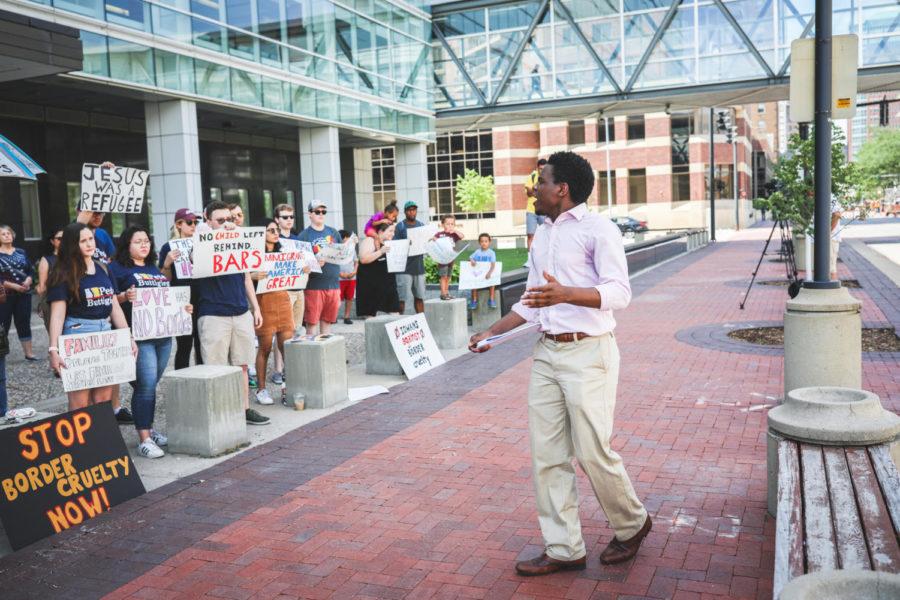Iowans protest border camp conditions
The border violence protest organizer, Dozmen Lee, presents a speech to the crowd on July 3 in front of the Neal Smith Federal Building in Des Moines.
July 4, 2019
Reports from migrant detention centers at the southern border have sparked national debate in recent weeks, including Rep. Alexandria Ocasio-Cortez’s tweets about her visit to the border Monday, in which she said women were told to “drink out of the toilets.”
More than 1,000 miles north of the border, nearly 100 Iowans stood outside Sen. Chuck Grassley and Sen. Joni Ernst’s Des Moines offices Wednesday, protesting those conditions.
Dozmen Lee, a senior in political science at Iowa State, organized the event with Brianna Carter, an Iowan activist. Lee said he had made a promise last year that he would do something about the situation at the border. As reports of the conditions at the detention centers spread this week, Lee said he was moved to action.
“Especially when I saw the conditions — them being left without soap or blankets — I just lost it,” Lee said. “I said, ‘I need to do something.’”
While politicians have offered conflicting descriptions of how detainees are treated, one senior manager at a detention center described the situation as “a ticking time bomb,” in a report by the Department of Homeland Security’s Office of Inspector General.
The report also details “serious overcrowding and prolonged detention” leading to “an immediate risk to the health and safety of DHS agents and officers, and to those detained.” The report specifically noted 31% of children at such facilities had been held longer than allowed by national standards, and many have lacked access to showers and hot meals.
Annaliessa Michelotti, a junior in women’s and gender studies, said the reports of how children have been treated inspired her to join the protest.
“My great-grandparents were Holocaust survivors, and they immigrated here after the war,” Michelotti said. “I just feel like my family didn’t survive the Holocaust to see kids be put in concentration camps.”
Ocasio-Cortez’s labeling of the facilities as concentration camps ignited debate in recent weeks, with the congresswoman facing criticism from many Republican officials, including Iowa’s own Rep. Steve King.
Michelotti said she believes there is “no question” that the term is accurate.
The two-hour protest consisted of organizers delivering speeches, chanting and reading testimonials from children at the camps. Within the testimonials, detainees frequently spoke of children being denied medical care.
A letter was passed around as the crowd ebbed and flowed throughout the afternoon — peaking at nearly 100 after beginning with roughly 50 people at noon. Representatives were present from the presidential campaigns of Mayor Pete Buttigieg, Sen. Kamala Harris, former Secretary of Housing and Urban Development Julián Castro and Sen. Cory Booker.
The letter, which garnered about 70 signatures, specifically asked the two Iowa legislators:
“Please work to Close the camps, Do not give on dollar to family detention and deportation, and Bear witness and reunite families.”
When Lee and Carter delivered the letter to Grassley’s office, a staff member offered a prepared statement regarding the senator’s stances on immigration issues.
According to the statement, Grassley is focused on working “in a bipartisan way to address migrant needs and hold the government accountable when it fails to provide adequate care or services.”
Representatives from Ernst’s office could not immediately be reached for comment, but the letter was accepted by a staff member in her office.
Grassley’s statement also speaks to the senator’s vote in favor of the Senate bill funding $4.59 billion in humanitarian aid at the border, which Ernst also voted in favor of. The U.S. House of Representatives also passed a funding bill last week for a similar amount but with standards for the care and health of children in the centers. After much debate among House Democrats, the Senate bill was passed by the House as well.
Looking ahead, Lee said individual protests won’t inspire legislative responses, but writing and lobbying legislators could lead to change.
“Alone we can’t [change anything],” Lee said. “But, the thing is, we’re not alone. There are protests going on, movements all over. I think, together, we will achieve something.”







